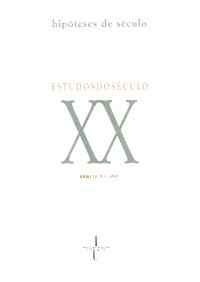Please use this identifier to cite or link to this item:
https://hdl.handle.net/10316.2/36547| DC Field | Value | Language |
|---|---|---|
| dc.contributor.author | Trindade, Luís | - |
| dc.date.accessioned | 2015-05-07T15:15:03Z | |
| dc.date.accessioned | 2020-09-24T05:13:54Z | - |
| dc.date.available | 2015-05-07T15:15:03Z | |
| dc.date.available | 2020-09-24T05:13:54Z | - |
| dc.date.issued | 2009 | - |
| dc.identifier.issn | 1645-3530 | - |
| dc.identifier.issn | 1647-8622 (digital) | - |
| dc.identifier.uri | https://hdl.handle.net/10316.2/36547 | - |
| dc.description.abstract | Segundo Agostinho de Campos, a preguiça é «a mãe de todos os vícios». No início do século XX, ele acreditava que a preguiça atingia a educação, a política, o lazer e atá a via nas trincheiras da Primeira Grande Guerra. Algo unia todos estes fenómenos: a massificação, também considerada, na perspectiva conservadora partilhada por Campos, como democracia. Isto significa que tanto a democracia como a cultura de massas eram vistas como formas da artificialidade da vida moderna que se opunham, através da preguiça, ao valor que deveria constituir a estrutura do edifício social: o trabalho. Fundamentando a sua ideologia no trabalho como valor político, Campos funcionou como intelectual orgânico do salazarismo uma vez que o regime conseguiu articular o conservadorismo e o capitalismo e subir ao poder quando Portugal enfrentava a crise do período entre as duas guerras mundiais. | por |
| dc.description.abstract | D'après Agostinho de Campos, la paresse est «la mère de tous les vices». Au début du XXéme siècle, il croyait que la paresse atteignait l'éducation, la politique, les loisirs et même la vie dans les tranchées de la Première Grande Guerre. Un lien unissait tous ces phénomènes: la massification, considerée également, selon la perspective conservatrice par Campos, comme la démocratie. Ceci qu'aussi bien la démocratie que la culture de masses étaient vues comme des formes d'artificialité de la vie moderne qui s'opposaient, à travers la paresse, à la valeur qui devrait constituer la structure de l'édifice: le travail. Basant son idéologie sur le travail comme valeur politique, Campos a fonctionné comme un intellectuel organique du salazarisme, une fois que le régime a réussi à articuler le conservatisme et le capitalisme et monter au pouvoir lorsque le Portugal affrontait la crise de la période entre les deux guerres mondiales. | fra |
| dc.description.abstract | According to Agostinho de Campos, idleness was «the mother of all vices». In the beginning of the twentieth century, he believed it affected education, politics, leisure, and even saw it in the trenches of World War I. There was one single bond between all these phenomena: massification, also recognized, from the conservative point of view shared by Campos, as democracy. Which means that both democracy and mass culture were seen as forms of the artificiality of modern life that opposed, through idleness, the value that should constitute the structure of the social edifice: labour. Basing his ideology on work as a political value, Campos functioned as the organic intellectual of salazarism as the regime that was able to articulate conservatism and capitalism and take power when Portugal was facing the crisis of the period between the world wars. | eng |
| dc.language.iso | por | - |
| dc.publisher | Imprensa da Universidade de Coimbra | - |
| dc.subject | ntellectuals | eng |
| dc.subject | Salazarism | eng |
| dc.subject | Capitalism | eng |
| dc.subject | Massification | eng |
| dc.subject | Ideology | eng |
| dc.subject | Intellectuels | fra |
| dc.subject | Salazarisme | fra |
| dc.subject | Capitalisme | fra |
| dc.subject | Massification | fra |
| dc.subject | Idéologie | fra |
| dc.subject | Intelectuais | por |
| dc.subject | Salazarismo | por |
| dc.subject | Capitalismo | por |
| dc.subject | Massificação | por |
| dc.subject | Ideologia | por |
| dc.title | A mãe de todos os vícios: Agostinho de Campos e a crise da massificação | por |
| dc.title.alternative | The mother of all vices: gostinho de Campos and the crisis of massification | por |
| dc.title.alternative | La mere de tous les vices: Agostinho de Campos et la crise de la massification | por |
| dc.type | article | - |
| uc.publication.collection | Revista Estudos do Século XX nº 9 | - |
| uc.publication.firstPage | 267 | - |
| uc.publication.issue | 9 | - |
| uc.publication.lastPage | 282 | - |
| uc.publication.location | Coimbra | - |
| uc.publication.journalTitle | Revista Estudos do Século XX | - |
| dc.identifier.doi | 10.14195/1647-8622_9_15 | - |
| uc.publication.section | Hipóteses de Século | - |
| uc.publication.orderno | 16 | - |
| uc.publication.area | Ciências Sociais | - |
| uc.publication.manifest | https://dl.uc.pt/json/iiif/10316.2/36547/239365/manifest?manifest=/json/iiif/10316.2/36547/239365/manifest | - |
| uc.publication.thumbnail | https://dl.uc.pt/retrieve/11609314 | - |
| item.fulltext | With Fulltext | - |
| item.grantfulltext | open | - |
| Appears in Collections: | Revista Estudos do Século XX | |
Files in This Item:
| File | Description | Size | Format | |
|---|---|---|---|---|
| a_mae_de_todos_os_vicios.pdf | 4.06 MB | Adobe PDF |  |
Items in DSpace are protected by copyright, with all rights reserved, unless otherwise indicated.
